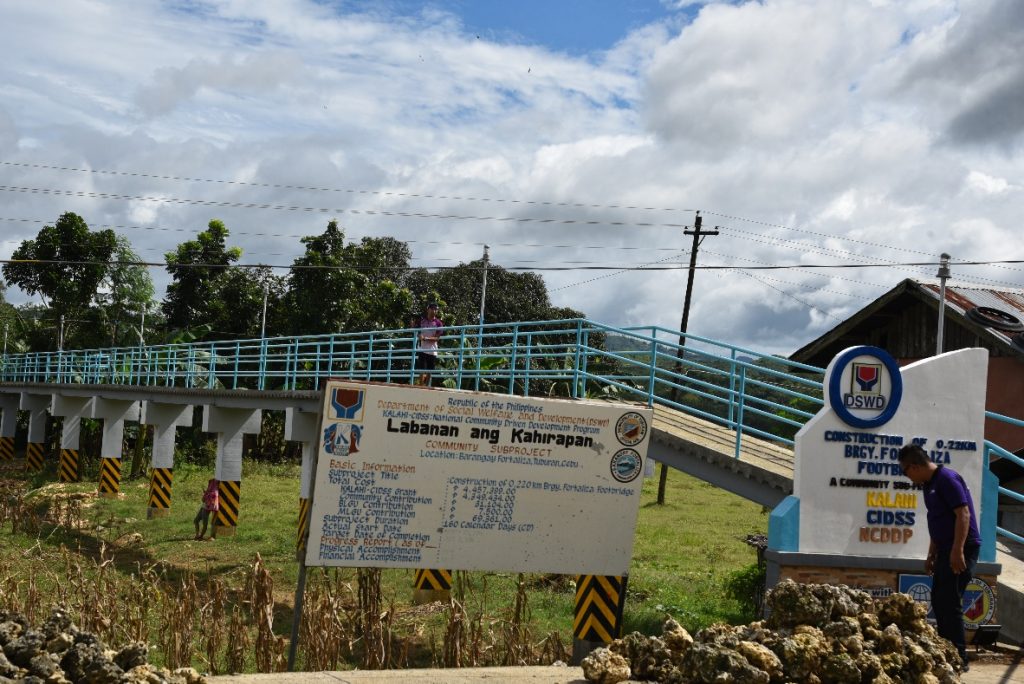
Life has never been easy for the residents of Barangay Fortaliza in Tuburan, Cebu. While most of the villages in the town are located in the mountains, Barangay Fortaliza is situated in the lowland. This makes the community as the catch basin of the waters coming from the upland.
Hence, every time a typhoon or heavy rains occurs in the town, the whole 25 hectares of land in Barangay Fortaliza will be flooded, causing damages to the community farm lands, leaving them unsuitable for growing crops for several months.
The situation also posed danger to students of Colonia National High School who are from the community and other neardby barangays of Caridad, Kansi, Bakywan, and Gaang, Children would use a makeshift raft called “gakit” to cross the flooded field. Sometimes, when it is too risky to cross, the students would opt to be absent from school.
For years, the residents had wanted to construct a safe passage way for their children as they go to school.
During a Municipal Inter-Barangay Forum (MIBF), Barangay Fortaliza was fortunate to be prioritized as one of the grantees of Kapit-Bisig Laban sa Kahirapan-Comprehensive and Integrated Delivery of Social Services (Kalahi-CIDSS).
Kalahi-CIDSS is one of the specialized programs of the Department of Social Welfare and Development (DSWD) which uses the Community-Driven Development (CDD) approach to encourage empowerment and community volunteerism. The program engages residents to participate in inclusive local governance through the identification and implementation of development programs which will address the needs of their community and improve their access to services.
Kalahi-CIDSS provided P4,349,934 to fund the construction of 22-meter footbridge that the community has been longing to construct.
“Sa wala pa kining footbridge daghan na ang na aksidente dinhing lugara, ilabi na sa mga bagyong nangagi. Lisod kayo ilabi na sa mga estudyante nga molabang diring dapita. Nakalasan na kinig kinabuhi sa usa ka bata samtang naglabang gamit ang gakit (makeshift raft), nalambud ang pisi hinungdan nga natuwad ang gakit ug nalumos ang bata,” (Before this footbridge was built, accidents happened here especially during typhoons. It claimed the life of a child who was crossing the river using the makeshift raft when the rope he was holding on got tangled which caused the raft to capsize), shared salome Agsoy, Project Preparation Team (PPT) chairperson of the barangay.
According to Salome, the footbridge in Fortaliza does not only provide a safe passage way, but it also opened opportunities to improve service delivery and boosted business and commerce in the barangay as well.
On a lighter side, the footbridge, with its scenic location, has become a tourist spot frequented by visitors and locals alike.
“There are passersby who would really stop and take pictures in the footbridge, there are also some instances where it was used as location for a pre-nup shoot,” shared Annalyn Cuer, barangay councilor of Fortaliza.
“This is a dream come true, this was worth all the sacrifices and the ridicule that we received from the non-volunteers which I just ignored. I held my head high when the footbridge was finally done,” Salome proudly said.
For Salome and the rest of the villagers who worked hard for the realization of this dream, the Kalahi-CIDSS project was an answer to their prayers and a solution which surfaced from volunteerism and the solidarity of their barangay towards a united goal to ensure the safety of the residents and their children.
The footbridge in Barangay Fortaliza is just one of the community projects coordinated through Kalahi-CIDSS. In 2018 alone, some 4,941 community projects were implemented nationwide. Among these are access roads, school buildings, mobile rice mills, day care centers, health centers, water systems, and streetlights, among others.
DSWD recognizes people’s participation as vital component in the implementation of Kalahi-CIDSS. Through community volunteerism and camaraderie, poor communities are given platform to take charge of their own development and participate in nation-building.
To date, Kalahi-CIDSS has 1,003,857 community volunteers around the country who can be tapped anytime to render voluntary services. -30-


